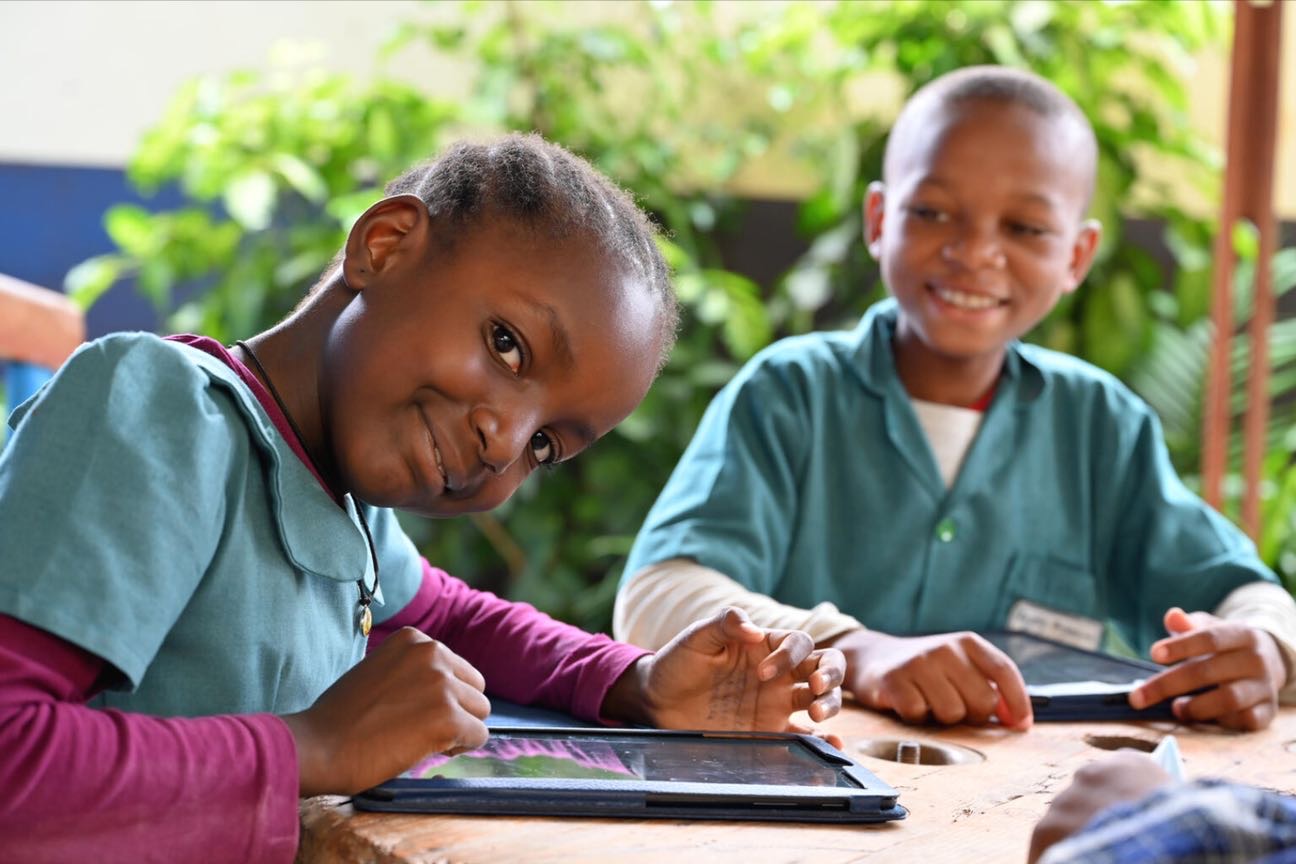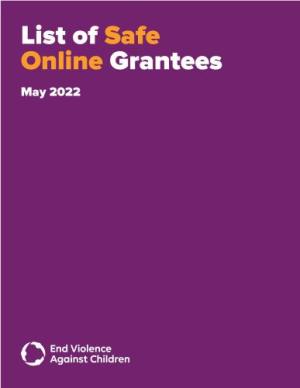 End Violence’s Safe Online Initiative has been leading on global efforts to make the internet safe for children by investing in strengthening systems, generating evidence and solutions, and fostering a strong collaborative network across sectors to put child online safety at the heart of policy and action.
End Violence’s Safe Online Initiative has been leading on global efforts to make the internet safe for children by investing in strengthening systems, generating evidence and solutions, and fostering a strong collaborative network across sectors to put child online safety at the heart of policy and action.
On 30-31 May 2022, Safe Online will bring together its grantees and partners from across the world alongside donors, and industry representatives from the Technology Coalition. This event is a unique opportunity for networking and dialogues within the Safe Online community. The first ever Safe Online Grantee Convening was organised in December 2019 in Ethiopia in which 50 organizations participated and shared perspectives on creating a safer digital world.
This year, the key focus of the two-day event will be 'networking and knowledge-sharing' across the main areas identified by the grantees, including discussions on best practice to translate evidence into change, cross-sector collaborations, industry role, latest technologies and much more. The network will immerse in the latest evidence and lessons on what works and what doesn’t to prevent and respond to online Child Sexual Exploitation and Abuse (CSEA) and identify strategic opportunities and levers to turn the tide on this escalating problem.
- Grantees will have a unique opportunity to hear perspectives from over 40 organisations doing groundbreaking work to disrupt tech-facilitated harm to children at national, regional and global levels.
- Organised jointly by the End Violence Partnership and WeProtect Global Alliance, a meeting with key donors (government, private sector and foundations) interested in promoting child online safety and building a common vision on how we can tackle CSEA online will take place on day 2.
Take a look at some of the amazing organisations joining us at the upcoming Safe Online Network Forum and read more about their work on creating a safer digital future for children.
With internet usage increasing rapidly in Bosnia and Herzegovina, child sexual exploitation and abuse is a growing problem. The Bosnia and Herzegovina (BiH) Child Protection Consortium – comprising UNICEF BiH, Save the Children and EMMAUS – implemented a three-year project to support the government and communities in BiH to prevent and tackle online CSEA.
It established the Safer Internet Center which hosts an Awareness center, Helpline and Hotline. Over 1.6 million people were reached with awareness raising activities through media and advocacy campaigns with information on reporting and prevention of online violence and available support services.
Explore the project’s four case studies on involving various sectors and actors to create a safer digital world, including parenting support, training law enforcement, enhancing technology and educating children on being safe online.
The End Violence funded Project DRAGON-S is developing resistance against online grooming of children by enhancing child safeguarding practitioners' work. It places practitioners' and children's voices at the heart of these solutions. By engaging with over 250 practitioners globally and worked with lived experience experts and children and young people to ensure end-user needs are met, the project has co-developed innovative technology to counter online grooming - a detection tool for law enforcement (DRAGON-Spotter) and a digital training platform for child safeguarding practitioners (DRAGON-Shield).
The Canadian Centre for Child Protection (C3P)
C3P has bolstered the capabilities of Project Arachnid – an innovative technological tool to target and disrupt publicly available child sexual abuse material. These efforts have had a significant impact on the global removal of child sexual abuse material (CSAM), and the prevention of online child victimisation.With the support from the End Violence Fund, Project Arachnid led to the removal of more than two million images and 35,000 videos from Free, a French telco giant, along with prompting the company to stop allowing anonymous users to upload content to their file hosting service, effectively eliminating this as a means for CSAM distribution.
The ESCAPE project represents INHOPE's vision to put an eco-system in place ensuring that every industry stakeholder and each member of the public around the globe has the option and awareness to report child sexual abuse material encountered online. The goal is to expand the Network globally, into high-risk countries where CSAM is being facilitated, produced or distributed.
With support from the End Violence Fund, two Hotlines in Serbia and Albania were welcomed into INHOPE membership in December of 2021, ensuring that the 6.9 million people in Serbia and 2.8 million in Albania have a dedicated national INHOPE member hotline to report online Child Sexual Abuse Material.
Explore the project’s Report Box tool to learn more.
5Rights Foundation - The "Child Online Safety (COS) Toolkit” is a roadmap for policymakers to make the online world that enables children to flourish. Showcasing best practice and ideas, it also provides a template policy that can be adapted and applied in any jurisdiction to uphold children's rights online. The recently launched Child Online Safety Toolkit has received support from international organisations, donors, and a global coalition of children’s rights groups. The Toolkit will catalyse the implementation of international commitments to children’s rights.
Visit the Toolkit website, access the summary presentation and this video.
The "Protecting children from cyber predators: a safe online future for all children in Ghana” project has worked to prioritise national efforts to promote a safe cyber space for children in Ghana so that they can enjoy positive and safe use of the internet. In three years, the project has advanced legislative and policy reforms, capacity strengthening of law enforcement and social service providers and developed a National Child Online Protection Framework. It also established a digital forensic lab to facilitate the investigation of electronic evidence from digital devices to inform judicial proceedings.
And all these efforts were supported by actions to train people around children to make the Internet safer – a total of 5,780 police officers were trained, while at least 163,925 children and adults were reached with key messages on online safety through social behavioural change community engagement and 38,399 people were engaged via social media platforms with online messages.
A $7 million investment brings light to the harms and risks children are facing in 13 counties – thanks to the groundbreaking large-scale research project implemented by ECPAT International, INTERPOL and the UNICEF Office of Research – Innocenti. This innovative and unique research undertaking uses a multi-sector approach and the specific expertise of these three global agencies and their local partners.
The findings have shown that tens of thousands, or even millions, of children in each country are being subjected to online child sexual exploitation and abuse each year. Around one in three children subjected to online CSEA did not disclose or report the abuse to anyone, and the most common barrier to reporting were that children simply don’t know where to go or who to tell, followed by feeling embarrassed or ashamed. The project makes recommendations for countries to make the internet safer, including prioritising children’s access to justice and supporting victims of online CSEA.
Learn more and explore the research from the countries here.
MEET MORE GRANTEES AND EXPLORE THEIR IMPACT.
Stay tuned for more updates on progress, impact and action from our Safe Online Networking Forum!
Image: © UNICEF/UN0551715/Dejongh
